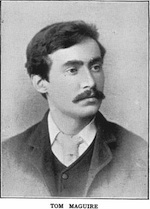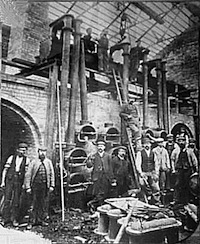Tom Maguire died tragically young, but for 10 years he built a formidable reputation as an orator, organiser and poet. JOHN BATTLE tells his tale.
Tom Maguire, the Leeds socialist pioneer, fought for a new politics at the end of the 19th century. He saw his struggle primarily as building up a movement to wrest control of the Leeds City Corporation from the grip of the established Liberals.
His politics were defined in the face of ‘Tory gold’ and ‘Liberal promises’. For him the key site of struggle against capitalism was the local city corporations which towards the end of the 19th century had strengthened their reach and powers. Taking political power from the Liberals to ensure the city could be run on socialist principles was his main campaigning focus. For Maguire, politics was about the capacity for local change, a Leeds socialism.
He died in 1895 at the young age of 29 but for 10 years as a political organiser, orator and poet he built up a tremendous campaigning reputation. At his death Keir Hardie remarked how the Labour movement “could ill afford to give back to the gods one gifted young comrade”.
Maguire was born in 1866 in the Bank district of Leeds to an Irish immigrant family. As a boy he sang in the choir in St Anne’s cathedral and was noted for his “musical voice and poetic tongue”. When he left school he got a job as a photographer’s assistant and was paid a low wage to touch up pictures.
He was immersed in Irish music and literature and knew the works of Keats and Shelley, and Laurence Sterne, all critical thinkers in his day. At 18, he picked up a copy of The Christian Socialist at a Secular Society bookstall and, as Edward Carpenter, recalled “before long was out on the streets preaching the cause”.
By September 1884 he was addressing a crowd of some 300 on the aims of socialism at Vicar’s Croft (now Leeds outside market). That month he set up a small branch of the Social Democratic Federation. In March 1885, at a meeting in the Royal Sovereign Inn, North Street, the branch declared itself a member of the Socialist League, following William Morris.
Before 1883 few dared declare themselves as socialists, while Chartism had been absorbed into the radical wing of the Liberal Party and the co-operative movement. As EP Thompson documented: “Until the new unionism of the later 1880s, the loyalty of the majority of skilled trade unionists to Gladstone’s Liberalism remained unbroken.”
But the Liberal government’s return to power under Gladstone led to increasing disappointment, not least over its imperialist approach to Ireland, while its failure to tackle poverty at home, intensified by the ‘great depression’, led to the development of the Socialist League which distanced itself from what Maguire described as “the political opportunism and state socialism of the SDF”.
Maguire’s name, along with that of Morris and 20 others, appears under the manifesto of the Socialist League first published in The Commonweal in February 1885. Maguire was an idealist but he was searching to fuse a socialist vision with practical politics engaged with everyday reforms. He was anxious to challenge the assumptions of laissez faire economic liberalism, and worried that focussing on land reform would distract the movement from addressing the centres of capitalism. He also passionately believed in the need for collective action, saying, “We working men … are socially one.”
Fighting Liberal notions
The early Leeds socialists focussed their criticism on Liberal notions of personal responsibility. Maguire himself publicly attacked the Charity Organisation Society for its complacency in regarding widespread unemployment in winter as normal and acceptable. He argued that full employment should be a public responsibility, something which became a basic tenet of the Independent Labour Party when it was formed in Bradford in 1893.
 The Socialist League ran campaigns with the unemployed in Leeds during the winters of 1891 to 1893, arguing that the Leeds Corporation should take on responsibility for the whole community and not just the business sector. Determined to push for practical local socialist reforms, Maguire published his own handbill in 1887 in which he announced that “a definite step is now being taken towards the formation of a socialist Labour Party in Leeds… The objects of socialism are briefly … to put a stop to the mad competition for existence, which is the cause of poverty, and to establish a co-operative commonwealth.”
The Socialist League ran campaigns with the unemployed in Leeds during the winters of 1891 to 1893, arguing that the Leeds Corporation should take on responsibility for the whole community and not just the business sector. Determined to push for practical local socialist reforms, Maguire published his own handbill in 1887 in which he announced that “a definite step is now being taken towards the formation of a socialist Labour Party in Leeds… The objects of socialism are briefly … to put a stop to the mad competition for existence, which is the cause of poverty, and to establish a co-operative commonwealth.”
To this end he worked for the formation of a local branch of the Gas and General Labourers’ Union among the stokers at the City Corporation’s New Wortley and Meadow Lane works in west Leeds (left). He struggled to get the Leeds Corporation to be more amenable generally to the “needs of Labour”. For Maguire this meant doing more than just making its workers and trade union members better off “financially, physically and morally”, it implied challenging industrial capital, whose owners were also the political leaders of Leeds.
During the wave of industrial unrest among the city’s unskilled workers in 1889/90 Maguire and his colleagues worked to build up trade unions such as the builders’ union, and to organise strikes and public campaigns for wage justice for workers in the city. With Maguire’s help, the gas workers won a momentous victory in 1890 against the anti-union policies of the Liberal-dominated corporation which had brought the dragoons in to suppress demonstrations. Maguire’s contribution was immense but he always insisted that “only by co-operation could working people expect to secure reasonable hours and better regulated work”.
By the summer of 1890 the first independent organisation of Labour had been set up in the city – the Labour Electorate League. Tom Maguire was still only 25.
The next couple of years saw the emergence of Independent Labour clubs as Maguire worked to wean the workers away from the Liberal-supporting trades council. By 1894 he looked to the ILP as a new vehicle for “being in touch with the humbler wants of the people” and for forging a new relationship with the trade unions. The challenge to Liberal representation was on.
But then, tragically, in March 1895, Maguire caught pneumonia and died. Friends found him alone at home without food to eat or coal in the grate. More than a thousand people turned out for his funeral, acknowledging him as “a labour leader”. He was buried in Beckett Street cemetery with the epitaph: “socialist, bold, cautious, true and loving comrade”.
A New Nursery Rhyme, by Tom Maguire
Sing a song of England,
Shuddering with cold
Doomed to slow starvation
By the gods of gold;
See her famished children
Hunger-marked, and mean,
Isn’t that a dainty dish
To lay before the Queen?
—-
John Battle is the former Labour MP for Leeds West, now involved in community organising in the city.
Tom Maguire: Socialist and Poet, a collection of Tom Maguire’s published poems, with commentary, was edited by John Battle and published by the Ford Maguire Society in 1997.
The Ford Maguire Society organises events on the socialist, feminist and radical history of Leeds. It is named after Isabella Ford and Tom Maguire, two Leeds socialist pioneers. Click here to find out more.



2 May 2014
[…] The following year saw pupils in schools going on strike. The movement began in Scotland, wanting less corporal punishment, a reduction in school hours and more. In Leeds, the first school to go out was Holy Rosary on Barrack Street, and others followed. There was no chance they’d win, of course, but it was indicative of the mood in Britain that they’d even try. Tom Maguire […]